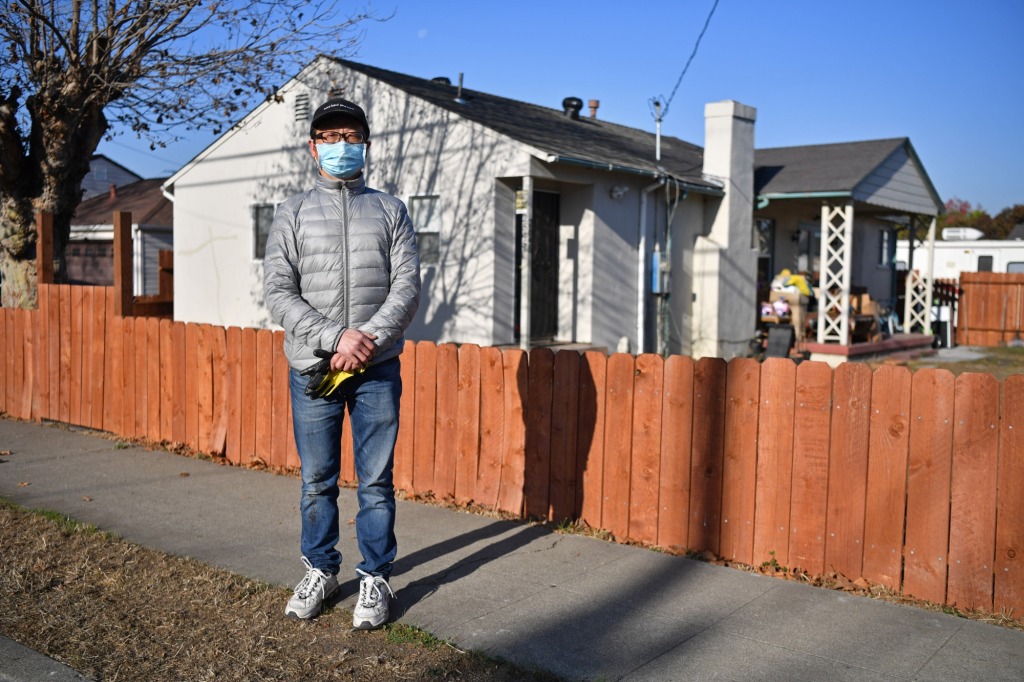Exasperated by Alameda County’s nearly three-year eviction moratorium, landlord groups are ramping up pressure on supervisors to lift the pandemic tenant protections they contend are ruining the livelihoods of many mom-and-pop rental owners.
The moratorium, which prevents most evictions across the county, is among the last remaining in the Bay Area and throughout the state. Landlords have filed lawsuits, petitioned local officials and one even planned a hunger strike in hopes of putting an end to the emergency ordinance, set to come up for review next week.
Jingyu Wu, an owner of a triplex in San Leandro, planned to go on a hunger strike Sunday morning outside the Alameda County Administration Building in Oakland to protest the eviction restrictions, which he said have left him teetering on the edge of bankruptcy.
Just before the pandemic hit, Wu agreed to rent one of the units to a woman with young children who was in desperate need of a home. Since then, the family has accumulated over $120,000 in rent debt as the moratorium has continued, he said. A first-generation immigrant who arrived in the U.S. from China in 2016, Wu is doing the maintenance work at the property himself to save money.
Until officials lift the ban, Wu, who is in his 50s, said he’s prepared to carry on his protest for “at least one or two months, until I die.”
“I know the hunger strike is very dangerous to my health,” he said. “But I have no choice. I must share my story to the public.”
Earlier this month, a Silicon Valley developer also vowed a hunger strike “until death” outside Sunnyvale City Hall to protest one of his projects being denied building permits. He started eating again eight days later once officials appeared to move forward on the paperwork to allow the project to proceed.
On Tuesday, a group of frustrated landlords plans to voice their concerns during a public meeting of the County Board of Supervisors to discuss potentially ending or modifying the moratorium. If the board declines to take action, the ban will likely expire at the end of April — 60 days after the county’s COVID-19 emergency is set to lapse Feb. 28.
Across Alameda County, an estimated 32,900 households owe a combined $125 million in unpaid rent, according to researchers with the National Equity Atlas. While the moratorium — like the now-expired state and federal eviction bans — still requires tenants to pay back landlords or seek rental assistance, rental owners say aid applications are frequently denied and it can be difficult for small landlords with limited resources to recoup the money in court.
Supervisor David Haubert said the moratorium has outlived its original purpose and supports ending it as soon as possible. At a recent town hall meeting, he heard from local rental owners about their challenges.
“Many housing providers report tenants exhibiting deliberate harassment of neighboring tenants, unlawful subletting, and ignoring lease terms with impunity because they feel emboldened by the eviction moratorium,” Haubert said in a statement.
Tenants’ rights advocates, meanwhile, contend the ban is needed to protect renters still reeling from the economic devastation of the pandemic and struggling to afford the region’s high housing costs. Last month, activists with Oakland-based Moms 4 Housing shut down an Alameda County supervisors’ meeting while demanding the county approve additional renter safeguards before the moratorium expires.
Even if supervisors decide to end the moratorium, ongoing eviction bans could continue shielding renters in a handful of cities.
Oakland recently extended its strict eviction protections through at least March. And the Berkeley City Council is set to consider either extending its moratorium or letting it expire on Tuesday. El Cerrito will likely allow its ban to lapse at the end of the month.
San Leandro — where Wu’s rental property is located — recently extended its eviction ban until February of next year, though the City Council plans to review the protections every 90 days. (Wu doesn’t think the ordinance will cover his tenant because it requires renters to prove a pandemic-related hardship.)
To force the issue, multiple landlord groups are also suing to end the overlapping eviction bans in the county and Oakland. They argue the protections have become an undue burden on rental owners since the worst of the pandemic is over and most people have returned to work.
After a hearing earlier this month, a federal judge could rule on whether to strike down the protections in the coming days or weeks, according to the California Apartment Association, a plaintiff in the cases.
Derek Barnes, chief executive of the East Bay Rental Housing Association, pointed to “woefully underfunded” state and local pandemic rental assistance programs for failing both property owners and renters.
Most of the programs, which stopped accepting applications last spring, were slow getting money out the door to landlords and tenants and only covered up to 18 months of back rent, despite local moratoriums lasting much longer. As a result, some landlords were forced out of the rental market entirely, Barnes said.
The push to end the moratoriums comes as much of the core Bay Area has seen a surge in eviction lawsuits that has eclipsed pre-pandemic levels, according to a Bay Area News Group analysis of court data. But in Alameda County, the local eviction protections dating back to March 2020 have kept cases at historic lows.

Kristi Laughlin, an advocate with the East Bay Alliance for a Sustainable Economy, worries if Alameda County’s moratorium ends soon, courts there will also be flooded with a deluge of backlogged eviction cases. After protections expired in Contra Costa County last year, the alliance saw a dramatic spike in calls from low-income tenants desperate for help as they faced eviction, she said.
Laughlin said she hopes that whenever the moratorium ends, local officials will provide more legal resources and rental aid for tenants at risk of losing their homes.
“Do we want more tents and makeshift cities popping up under overpasses in our cities?” she asked. “We have to really approach this in another way.”
Wu is demanding the same level of assistance for landlords.
“I feel the government only protects tenants and ignores landlords,” he said. “They must protect both sides.”










